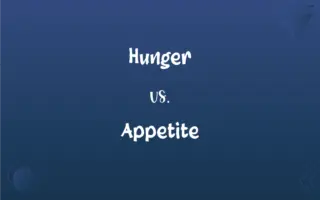Has vs. Have: What's the Difference?
Edited by Janet White || By Harlon Moss || Updated on October 25, 2023
"Has" is the third person singular present tense of "have," while "have" is used with first and second person singular, and plural forms.

Key Differences
"Has" and "have" are both forms of the verb "to have." They indicate possession, relationships, or various other relationships and states. However, their usage is determined by the subject of the sentence. "Has" is specifically used with the third person singular, like "he," "she," or "it." For instance, "He has a car" demonstrates the possession of a car by a third person.
Conversely, "have" is versatile in its application. It is used with the pronouns "I" and "you," which are singular. For example, "I have a book" or "You have a pen." Not only that, but "have" also pairs with plural subjects like "we," "they," or plural nouns like "dogs." In such cases, sentences like "They have tickets" or "Dogs have tails" are formed.
Additionally, both "has" and "have" are used in creating perfect tenses in English. "Has" aids in forming the present perfect tense for third person singular subjects. An example would be, "She has traveled to France." On the other hand, "have" is used with "I," "you," "we," and "they" in this tense. For instance, "We have visited the museum."
While "has" is mostly confined to indicating possession for third person singular, "have" has broader applications. "Have" can indicate experiences, actions, or obligations, as in "I have been to Spain," "They have played soccer," or "I have to go."
Both "has" and "have" are integral to English grammar, with their roles defined by the subjects they accompany. Mastery of their appropriate usage is key to forming accurate and fluent English sentences.
ADVERTISEMENT
Comparison Chart
Person & Number
Third person singular (he, she, it).
First & second person singular, plural (I, you, we, they).
Usage in Perfect Tense
Forms present perfect for third person singular.
Forms present perfect for I, you, we, they.
Indication
Mainly possession for third person singular.
Possession, experiences, obligations for multiple subjects.
Common Phrases
"He has," "She has," "It has."
"I have," "You have," "We have," "They have."
Dependency
Depends on the singular subject.
Versatile; works with various subjects.
ADVERTISEMENT
Has and Have Definitions
Has
Used in forming present perfect tense for singular subjects.
He has visited the Eiffel Tower.
Have
Used in forming perfect tenses.
They have lived here for years.
Has
Third person singular present of "have."
She has a pet cat.
Have
Expresses obligations or necessity.
I have to finish my homework.
Has
Shows relationships or attributes for singular entities.
The book has many pages.
Have
Indicates possession or ownership.
I have a bicycle.
Has
Reflects obligation or necessity in questions for singular subjects.
Has she any idea about the plan?
Have
Reflects relationships or attributes.
We have two children.
Has
Indicates possession for singular subjects.
The store has new stock.
Have
Shows experiences or actions.
I have seen that movie.
Has
Third person singular present tense of have.
Have
To be in possession of
Already had a car.
FAQs
What is the basic function of "has" and "have"?
"Has" and "have" are both verbs used to indicate possession or to describe relationships and characteristics.
When do we use "have"?
"Have" is used with first and second person singular (I, you), and all plural subjects.
When do we use "has"?
"Has" is used with third person singular subjects, like he, she, it, or singular nouns.
Do "has" and "have" change in past tense?
Yes, both "has" and "have" become "had" in the past tense.
Do "has" and "have" have irregular conjugations?
No, but their past tense, "had," is the same for all subjects.
What are the common errors with "has" and "have"?
Mixing up "has" and "have" with their respective subjects and incorrect use in tenses are common errors.
How are "has" and "have" used in questions?
As auxiliary verbs, they precede the subject. E.g., "Have you eaten?" or "Has she arrived?"
Are "has" and "have" used in expressions or idioms?
Yes, such as "have a break," "have a good time," or "has a point."
How is "have" used in present perfect tense?
"Have" is used with subjects I, you, we, and they followed by a past participle, e.g., "They have seen that movie."
Can "has" and "have" be used as main verbs?
Yes, when indicating possession, e.g., "He has a car" or "I have a pen."
What's the negative form of "have"?
"Have not" or the contraction "haven't."
Is there a difference between "has got" and "has"?
Both can indicate possession in British English, but "has got" is more informal. In American English, "got" is often omitted.
How is "had" different from "has" and "have"?
"Had" is the past tense form, while "has" and "have" are present tense forms.
Can "has" and "have" function in causative sentences?
Yes, e.g., "I had him repair my car."
Are "has" and "have" used in other tenses besides present perfect?
Yes, they are also used in perfect continuous tenses, e.g., "She has been running" or "They have been playing."
Can "have" function as a modal verb?
Yes, "have" can function as a modal verb in constructions like "have to" which indicates necessity.
How is "has" used in present perfect tense?
In present perfect tense, "has" is used with third person singular subjects followed by a past participle, e.g., "She has finished her work."
What's the negative form of "has"?
"Has not" or the contraction "hasn't."
Can "have" be used to mean "experience"?
Yes, e.g., "I have a headache" or "She's having a great time."
How do "has" and "have" function in passive voice?
They are used with "been" and a past participle, e.g., "The work has been done."
About Author
Written by
Harlon MossHarlon is a seasoned quality moderator and accomplished content writer for Difference Wiki. An alumnus of the prestigious University of California, he earned his degree in Computer Science. Leveraging his academic background, Harlon brings a meticulous and informed perspective to his work, ensuring content accuracy and excellence.
Edited by
Janet WhiteJanet White has been an esteemed writer and blogger for Difference Wiki. Holding a Master's degree in Science and Medical Journalism from the prestigious Boston University, she has consistently demonstrated her expertise and passion for her field. When she's not immersed in her work, Janet relishes her time exercising, delving into a good book, and cherishing moments with friends and family.































































